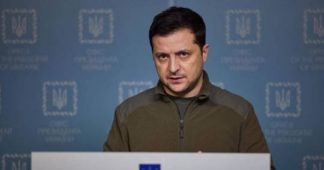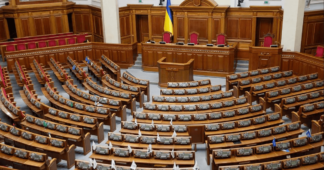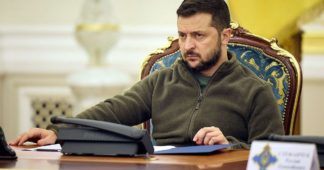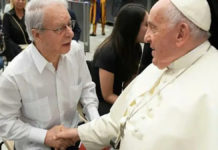The Ukrainian President called for the Russian Orthodox Church to be outlawed after Kiev’s intelligence agency conducted several raids on Orthodox cathedrals
Posted on
ategories Ukrainian President Volodymyr Zelensky announced he is seeking to ban all religions with ties to Russia. He claims the move is needed to “guarantee spiritual independence to Ukraine.”
This law will target millions of Ukrainians who identify as Russian Orthodox.
During his nightly address on Thursday, Zelensky announced he was introducing legislation that would eliminate religious organizations affiliated with Russia from operating in Ukraine. He said this will make “it impossible for religious organizations affiliated with centers of influence in the Russian Federation to operate in Ukraine.”
The Ukrainian leader said it was necessary to purge the church to preserve the country’s spiritual independence. Adding, “We will never allow anyone to build an empire inside the Ukrainian soul.” Zelensky denounced Ukrainians continuing to attend the parishes as failing to overcome “the temptation of evil.”
He claimed a series of recent raids by Kiev’s intelligence found orthodox churches which remain connected with the Moscow Patriarchate have been acting as operatives for the Kremlin. In his address, Zelensky instructed his security forces to further target Russian Orthodox parishes.
Around two-thirds of Ukrainians identify as Eastern Orthodox Christians. At one point, the majority of Ukrainians attended parishes that followed the Moscow Patriarchate. Some recent polls say that number has dwindled to under 15%. However, the polling was only conducted in territory that was controlled by Ukrainian forces. Zelensky has vowed to return those regions to Kiev’s authority.
Dmitry Medvedev, deputy chairman of the Russian Security Council, responded by slamming Zelensky’s move as authoritarian. “The current Ukrainian authorities have openly become enemies of Christ and the Orthodox faith,” he said.
* Kyle Anzalone is the opinion editor of Antiwar.com, news editor of the Libertarian Institute, and co-host of Conflicts of Interest.
We remind our readers that publication of articles on our site does not mean that we agree with what is written. Our policy is to publish anything which we consider of interest, so as to assist our readers in forming their opinions. Sometimes we even publish articles with which we totally disagree, since we believe it is important for our readers to be informed on as wide a spectrum of views as possible.








